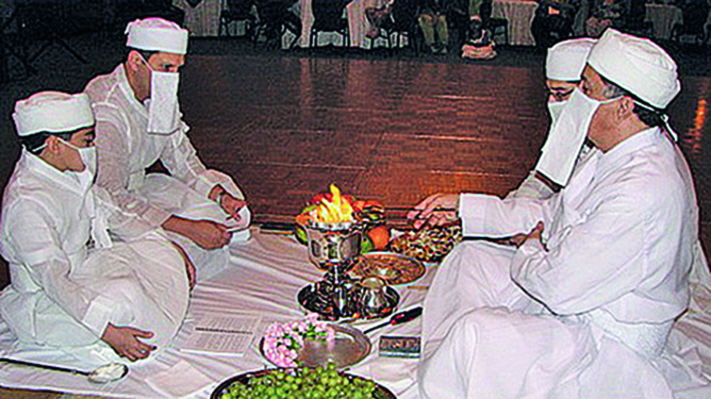As per the Shehenshahi calendar, we are currently observing the holy Dae Mahino. This month is dedicated to the Supreme Divinity (Ahura Mazda), and therefore considered one of the most significant in the Zoroastrian calendar of twelve months. The term Ahura Mazda is translated as Ahura (Lord) and Mazda (Wisdom). More liberally translated, Ahura is ‘Creator’ (and therefore Lord or Master of all creations) and Mazda is ‘Wisdom’ or the Divine Order within all things created by Ahura. In other words, this universe is created with ‘Divine Order or Principles’ also referred to by Zarathustra, as ‘Asha’.
One reason why Zoroastrians revere all good creations (fire, earth, water, vegetation, sun, moon etc.) is because they do not see Ahura Mazda as an external force outside of creation, but an internal force, within every creation.
Gratitude To The Creator
Mah Dae Dadaar is a month of thanksgiving to the Creator, and one way of expressing gratitude ritually is by performing Jashan ceremonies, either at home, at office or at an Aatash Behram/Agyari. It is considered most meritorious to perform Jashan on each of the four special days of this month (Day 1: Hormuzd; Day 8: Dae Adar; Day 15: Dae Meher; and Day 23: Dae Deen), which are dedicated to the Supreme Creator and the Yazata having the Creator’s aspect, presiding over Fire (Dae-pa Adar); Light and Justice (Dae-pa Meher); and the Religion (Dae-pa Deen). Each of these four days is referred to as Jashan of Dadvah (Jashan of the Creator).
Jashan is considered a ritual of gratitude giving family, friends and community a meaningful opportunity to bond together, pray together, offer gratitude together and feast on the ritual offering (Chashni) together.
What to pray?
While the Hormuzd Yasht may be prayed daily, it is considered particularly meritorious to pray this Yasht (hymn) during this Holy Month. It is composed mostly in Avestan language, with some Pazand passages, dedicated to Ahura Mazda. In this hymn, Asho Zarathushta inquires of Ahura Mazda as to which of his names (which also denote Ahura Mazda’s innate qualities) are most powerful to protect the devotee against all types of evil. Ahura Mazda provides the first set of twenty names, which shares a glimpse into His Divine attributes.
The very first name and attribute is nāma ahmi or self-created and self-existent. The second name is vāthwyō or protector while the third is avi-tanyō or omnipresent. The fourth name is asha vahishta or best righteousness while the fifth is vīspa vohu mazdadhāta asha-chithra or possessing every-goodness of pure origin.
Thus, Ahura Mazda is self-created (Khu-da) without beginning or end, the protector of all good creations, present in every creation, righteous and all good.
How best can we befriend Dadaar Hormuzd?
Those who pray the Hoshbam at dawn would recollect praying, “Asha vahishta, asha sraeshta, daresāma thwā, pairi thwā jamyāma, hamem thwā hakhma,” which means, “Through the best righteousness, excellent righteousness, O Ahura Mazda, may we catch sight of Thee and may we come near Thee and attain Thy eternal friendship.” Thus, we can earn God’s eternal friendship by walking on the path of Asha (truth and righteousness).
In this holy month of Dae, may each one of us endeavour to earn Ahura Mazda’s friendship through our daily conscious effort to walk on the path of Asha. For indeed the Colophon to Yasna asserts, “There is but one path, that of Asha. All other paths are false.”
When offering any prayer, focus on connecting with the Creator. The object of prayer is to realign your heart and consciousness with the Creator through the attitude of gratitude and not the attitude of material greed. Also, make prayer a regular habit. Like any human relationship, if one does not spend enough or quality time with that person, the relationship suffers. Prayer is our daily ‘chat’ with the Divine – it’s a way for us to spend time with the Creator. Prayer is a pathway to connect our tiny mind with the infinite mind of the universe.
Our Loving Creator
In Zoroastrian tradition, Ahura Mazda is not to be feared but simply loved, respected and befriended. In the Gatha, particularly, the Supreme Divinity is referred to as ‘Friya’, meaning friend or beloved. In other words, a Zoroastrian’s relationship with God is built not on the basis of awe or fear, but on friendship and love.
God is to be loved, not feared for his wrath. God is to be considered as a friend and not as a demanding or domineering Lord who constantly puts his subjects through tests and sacrifices. In Zoroastrianism, God is not to be pleased with sacrifices or fasts. In fact, as a ‘friend’, Ahura Mazda wants all His friends to enjoy Ushta or happiness. In the Zoroastrian calendar of 365 days, not a single day is set aside for fasting – all that Ahura Mazda wants is His friends to fast from is from doing wrong – in thought, word or deed.
Prayer makes us humble. It makes us realize that we just a tiny spark. As we progress and purify ourselves of our ego and unnecessary arrogance, our friendship with the Divine becomes increasingly clear and conscious. The Divine was, is, and will always be our best friend – a Great Force of Infinite Energy. One can confide in this energy, reveal everything. This Energy is the source of compassion, healing and wisdom that opens the path of self-realization.
May we celebrate this Holy Month with gratitude, friendship, love, understanding and giving!
- Why Pray In A Language We Do Not Understand? - 29 March2025
- Celebrate Nature’s New Year With Purity And Piety of Ava - 22 March2025
- Celebrate Navruz 2025 With The Spirit Of Excellence And Wholesomeness - 15 March2025
